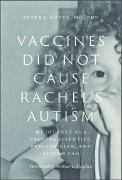BOOKMARK
Title: Vaccines Did Not Cause Rachel’s Autism: My Journey as a Vaccine Scientist, Pediatrician, and Autism Dad
Author: Peter J. Hotez, MD, PhD
Publisher: Johns Hopkins University Press
Publication date: October 2018
Price: $22.95, hardcover; 240 pages

English physician Edward Jenner invented the smallpox vaccine in 1796. When smallpox was eventually eradicated in 1979 due largely to population-based vaccination programs, the disease had already killed an estimated 500 million people in the 20th century. Smallpox is but one of many scourges that have been eliminated or controlled by vaccination. Arguably, vaccination has made the greatest contribution to global health of any human intervention apart from the introduction of clean water and sanitation. Yet, bitter opposition to vaccination has existed as long as the intervention itself, and despite irrefutable scientific evidence, antivaccine movements are still active, often attracting celebrities as their spokespersons.
A new book by Peter J. Hotez, MD, PhD, Vaccines Did Not Cause Rachel’s Autism: My Journey as a Vaccine Scientist, Pediatrician, and Autism Dad, examines both sides of the debate on vaccination. Dr. Hotez is a pediatrician-scientist who develops vaccinations for infectious tropical diseases that afflict the world’s poorest people. In 1994, his 19-month-old daughter Rachel was diagnosed with autism. He became concerned about the decades-long rise of the antivaccine collective and its narrative connecting childhood vaccines and autism. This excellent book grew from his scientific activism against a dangerous antiscience movement that puts populations, especially children, at risk.
A Giant Medical Advance
The book is organized into 12 chapters, beginning with the aptly titled “Family Interrupted.” In the succeeding chapters, Dr. Hotez gives an information-laden, globetrotting history of vaccination and the fascinating scientists, doctors, and policymakers who were at the forefront of massive population-based vaccination efforts.
The chronicle reminds us that we’ve grown complacent about the wonders of modern medicine and how it improves and saves lives. Dr. Hotez points out that with the exception of pertussis and breakthrough measles epidemics, most of the terrible killer infections have disappeared in the United States. The Centers for Disease Control and Prevention has determined that 14 diseases have been eradicated or will be soon. This is great news and cause for celebration, yet some remain radically unconvinced.
This book has three distinct narratives: the science and determination behind the vaccines that have eradicated or subdued killer infectious diseases worldwide, the sociopolitical interplay of proponents and opponents to vaccination, and one family’s struggle with autism—a disease in the crosshairs of the vaccination debate—which serves as a perfect underscore for the first two themes.
Illness Is a Family Affair
Dr. Hotez is an accomplished researcher with a stellar academic pedigree. It is also evident that he is a humanitarian. He describes, with unemotional candor, the familiar disruption of chronic disease.
He and his wife, Ann, were settled in Boston as Dr. Hotez was completing his residency in pediatrics at Massachusetts General Hospital. His medical career path was on the fast track. The young couple began a family—first a boy, then a girl, then another girl, Rachel.
Dr. Hotez notes that there was nothing special about his wife’s pregnancy or Rachel’s birth. Not surprisingly, Ann was the first to notice something a bit unusual about Rachel compared with the other children. “She often mentioned that Rachel was not as ‘huggy’ as the other two.”
Imponderable Costs
Dr. Hotez’s account of Rachel’s diagnosis with autism and the subsequent years of unsuccessful therapy is heart-rending. The Hotez family makes life-changing adjustments in order to keep Rachel living with them. She was both a flight risk and so difficult to manage that it became impossible for them to obtain child care. Readers of The ASCO Post, who are all too familiar with financial toxicity issues for patients with cancer, will find these sections riveting.
In the United States, we need science to begin chipping away at the damage done by the antivaccine lobby. Otherwise measles outbreaks ... will be just the beginning of something far worse.— Peter J. Hotez, MD, PhD
Tweet this quote
Dr. Hotez writes, “Recent estimates indicate that the costs of a child with autism run in the millions over a lifetime. That seems about right. Finances aside, it is and has been enormously stressful having Rachel in the house for the past 25 years. The toll on us and her siblings remains to be fully determined.” This is a profoundly honest and painful statement. He also quotes Ann, who adds: “I think every parent of a special needs child worries about who will care for their adult child when they are not here anymore.”
A simple trip to the dentist was an ordeal that left the author and his wife exhausted. They have no answers to the multitude of medical and social questions that arise in this powerful book about their autistic child, who became an adult still incapacitated by her disease.
False Data
Chapter 6, “The British Invasion,” is when Dr. Hotez begins his pushback activism against the antivaccine zealots. In 1998, a study appeared in The Lancet claiming that the measles-mumps-rubella vaccine caused autism in 12 children. The study stoked fear and debate among parents and physicians and caused a ripple effect. The paper was later retracted after reviewers found clear evidence of data falsification. But the damage was done, and the ripple effect is still with us.
Dr. Hotez ends his fine book with a valuable message: “In the United States, we need science to begin chipping away at the damage done by the antivaccine lobby. Otherwise measles outbreaks like the one in the Somali community in Minneapolis–St. Paul will just be the beginning of something far worse.”
Dr. Hotez has opened his heart and mind on the pages of this important book, which reads like a psychological autopsy of a family living and struggling with debilitating illness. It is highly recommended. ■

